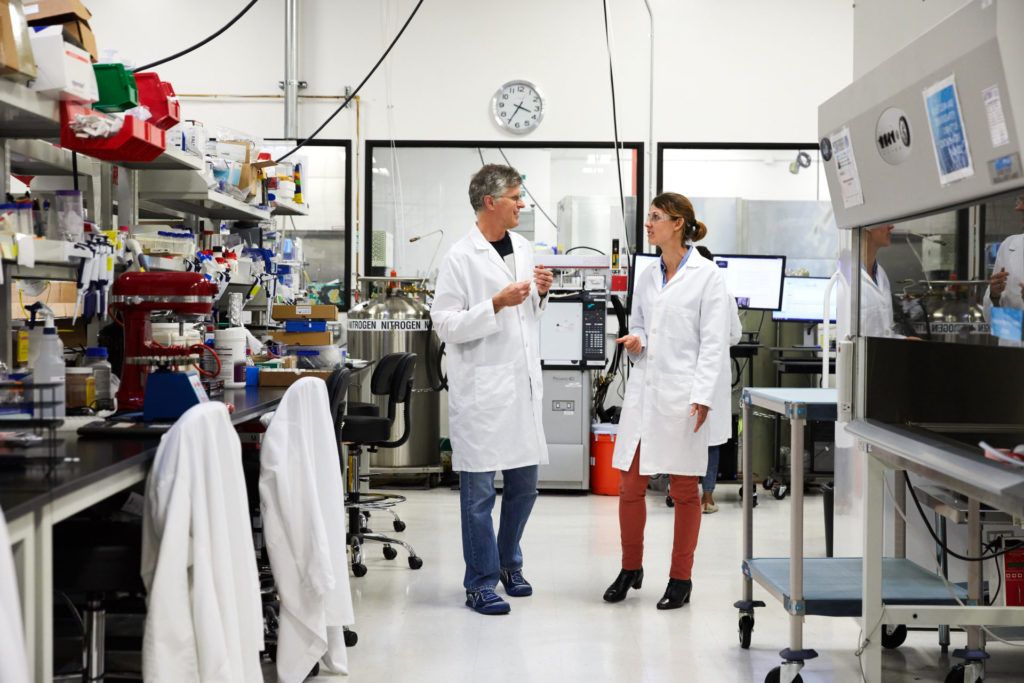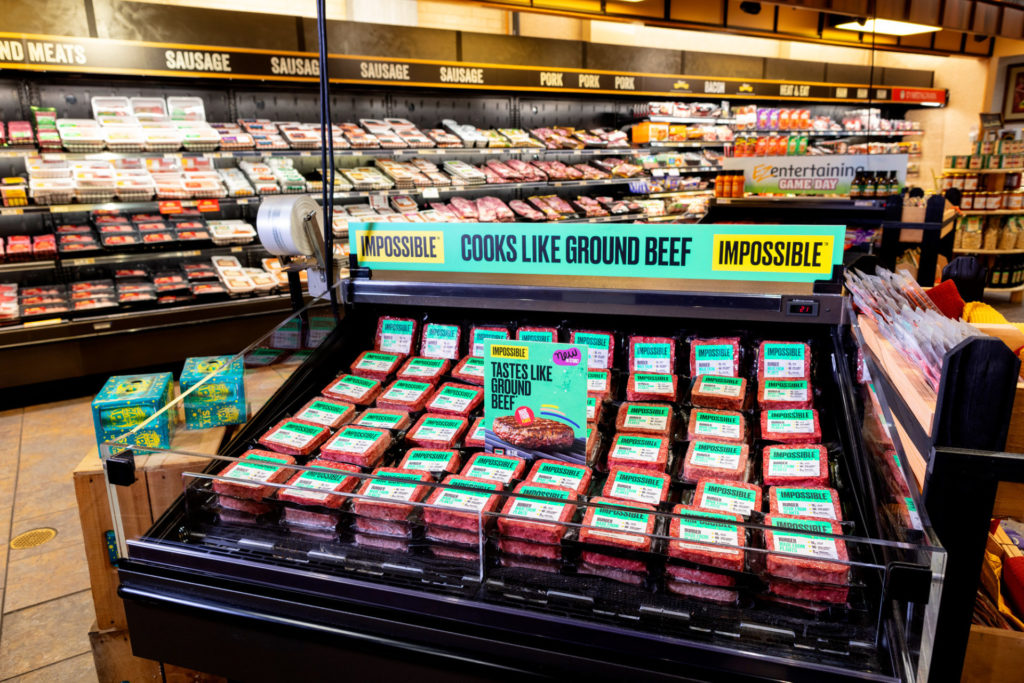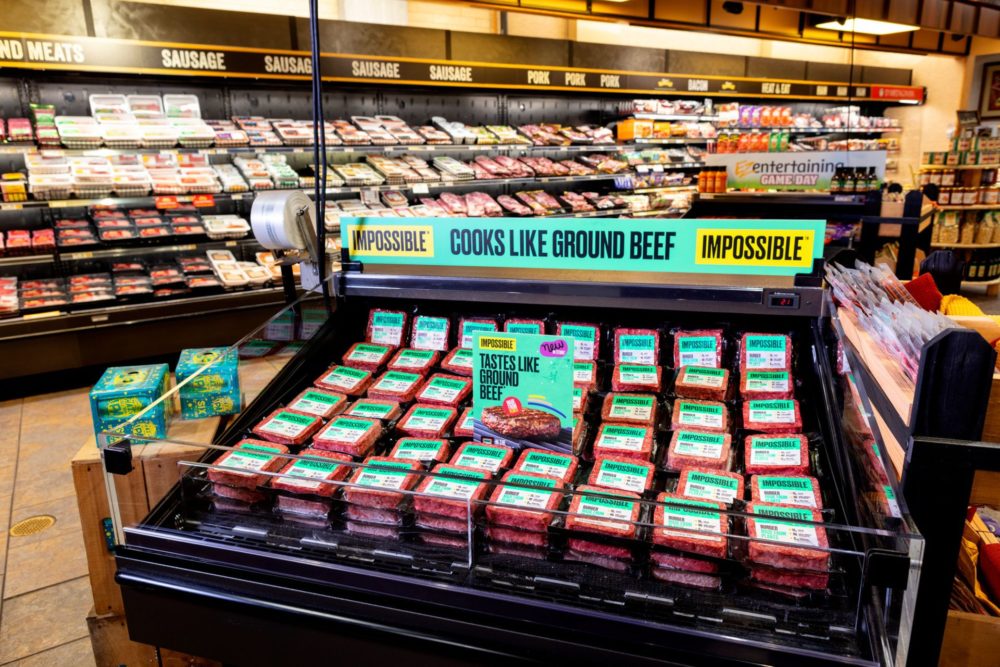Today, Patrick Brown steps down as CEO of Impossible Foods – the plant-based protein juggernaut he founded in 2011.
Peter McGuinness, former president and chief operating officer at yogurt brand Chobani, has taken the reins; Brown will remain on Impossible’s board and take up the new post of “chief visionary officer,” in which he will lead the company’s “research and technology innovation, strategic initiatives, public advocacy and, most importantly, our mission.”
While the unexpected timing may have been surprising — announced, as it was, in an ‘out-of-the-blue’ company blog post by Brown last month — the relinquishment of the top role itself may not be particularly shocking to observers of Impossible Foods and the broader alt-protein market.
For one thing, in McGuinness, Impossible Foods is getting a seasoned executive from the fast-moving consumer goods (FMCG) brand sector who has spent the last nine years selling Greek-style yogurt to the public (he was the company’s chief marketing officer between 2013 and 2017 and, before that, had a two-decade career in the advertising and public relations industries.)
It’s worth underlining that Chobani’s yogurt isn’t plant-based; it’s of the original, cow-derived variety. That Impossible is bringing McGuinness on board — someone with experience in the conventional, ‘mainstream’ protein industry — speaks volumes.
Brown, on the other hand, never really fit the ‘typical’ FMCG exec profile.
A no-holds-barred mission
After launching Impossible and dedicating much time and effort to his self-assigned mission of ending animal agriculture by 2035, Brown continued for a time in his prolific career as an academic biochemist. (Prior to entering the alt-protein world, the medical doctor’s achievements included the invention of the DNA microarray and the establishment of the Public Library of Science (or PLoS), one of the first large open-access publishers of scientific and medical research.)
He also co-founded Lyrical Foods, a startup producing plant-based cheese and other dairy products under the Kite Hill brand.

There was a sense with Brown that he may have been trying to do too many things all at once; which likely wouldn’t have been conducive to Impossible’s evolution into a profitable food business competing directly with the established big brands.
Another of Brown’s quirks — which may be a blessing or a curse, depending on your perspective — is his outspokenness.
Having followed a meat-free diet for most of his life, he admits to having “zero interest in [eating] something that tastes like meat” — in other words, the kinds of products made by his company — but instead targets the carnivorous majority in countries like the US.
Honest though it may be, that isn’t necessarily the best thing to say from a marketing perspective.
And on that point of winning over regular meat-eaters, Brown has made no bones about his views on conventional, animal-derived protein products. Here’s just one example of the kind of language we’ve come to expect from him, from an interview with The Guardian last year:
“The entire cause of the catastrophic collapse of wildlife populations, which are less than a third of what they were 50 years ago, globally, is the use of animals as a food technology […] Cows outweigh every remaining wild vertebrate on land by more than a factor of 10. Just the cows. We’ve literally totally replaced biodiversity with cows. Let’s get rid of friggin’ cows and let nature recover.”
When asked about the negative impact of such a measure on livestock farmers and other meat industry workers, Brown’s blunt response was that “they’re not going to be in that business anymore.”
(The Guardian reporter describes Brown as spending the interview “fidgeting with the impatience of someone who is certain they are right.”)
Now, there’s an argument to say that this kind of no-holds-barred, apocalyptic, even accusatory approach is what’s needed to shake the sheeple from their mass hypnosis and end their addiction to animal flesh.
Meat-less impact
But relentless repetition of these environmental and ethical arguments — coherent if perhaps over-simplistic as they may be — is not by itself going to get a sufficient number of regular meat-eaters to convert to flexitarianism overnight.
One just needs to look at the markets to see that a world dominated by slaughter-free meat is far from a fait accompli; Impossible Foods’ publicly-traded archrival in the plant-based protein race, Beyond Meat, has hit various roadblocks in both the retail and foodservice sales channels of late – and it’s not the only one.

Maple Leaf Foods president Curtis Frank, speaking after the release of the Canadian company’s annual and quarterly results last month, said “all major brands and products across the [plant-based] category are experiencing similar challenges, which largely seems to be driven by consumers’ experience in terms of taste, price, degree of processing and ease of preparation.”
Many plant-based meat replacements still fall behind conventional meat when it comes to taste, or the perception thereof, with a recent study by food consultancy Chew finding that even a mid-range, animal-derived beef burger was able to beat nine of the US’s top-selling plant-based analog patties on both flavor and nutrition (the only category where the plant burgers won was sustainability.)
Taste and texture are where the war to reduce our reliance on animal protein will be won. In fairness, this is something that Brown is keenly aware of. Much of Impossible’s cutting-edge innovation has been directed towards solving this problem; not least its process for creating heme in genetically-modified soybean plants to emulate the ‘bloody’ umami quality of animal-derived beef. This, in fact, has attracted criticism — and even a lawsuit — from some of the more orthodox corners of the vegan and vegetarian movement which object to the presence of GMOs in plant-based products.
‘Complete vaporware’
But down other corridors of potential technological inquiry, Brown has slammed and bolted the doors. He has consistently rubbished the concept of cell-cultured meat, describing it on one occasion as “complete vaporware.”
While the category is still some way off of being economically viable, progress has nevertheless been made; and regardless of how long it might take, it seems somewhat ill-considered to dismiss out of hand a technology that could massively reduce society’s reliance on animal agriculture (I’m stopping short of Brown’s own ‘elimination of livestock farming by 2035’ objective, which has its own whiff of vaporware.)
Moreover, by saying this, Brown seemed to be implicitly ruling out Impossible ever being involved in cultivated meat (on his watch, at least.)
If the goal is for Impossible Foods to inherit the mantle of today’s major agrifood corporates, becoming one of the ‘Big Food 2.0′ players and a leading producer of protein on a global scale, then precluding an entire category like cell-cultured meat at this relatively early stage could prove a mistake.
Which brings us back to Impossible Foods’ incoming CEO, McGuinness.
With someone new at the helm, who has come from outside the company with years of experience in marketing and FMCG products, Impossible Foods has a chance to make a fresh start and plot a slightly different course to that which was set under Brown.
Broadly speaking, there are three options for the company now.
A new path for Impossible?
First, McGuinness could encourage it to embrace a more all-encompassing strategy, exploring a wider variety of potential product lines; and perhaps even keeping the doors open for emerging technologies like cultivated meat – just as rival Eat Just has done, by becoming both a plant-based and cell-cultured protein business. This could include internal R&D activities or investments in other companies working with the technology. Inevitably, such an approach comes with heightened costs and risks; but also allows the business to diversify as it continues to scale and expand.
Second, McGuinness might decide Impossible should adopt a more ‘naturalist’ approach, dropping GMO elements in order to appeal to both vegetarians and meat-eaters who are conscious of keeping their food as free as possible from post-harvest tinkering. This may appear less risky than the first option but might also be suicidal for the business given the centrality of heme to its taste – which, as discussed above, is key to its appeal among consumers.
The third option for McGuinness is to take neither turn, but rather to keep travelling straight ahead: that is, for the company to continue as before, releasing incrementally improved Impossible Burgers every few years and adding a new product line here or there. But given the headwinds facing the nascent plant-based protein industry; the ever-increasing number of competitors; and with Impossible slated to be exploring an IPO sometime in the not-too-distant future — ‘more of the same’ is unlikely to excite — or assure — either consumers or investors.





